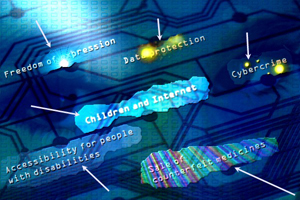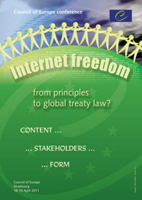
The work of the Council of Europe on internet governance centres on human rights issues, most notably freedom of expression, data protection, accessibility and cybercrime.
With the Convention on Cybercrime, the Council of Europe created the first (and so far only) binding international treaty on the subject. The convention outlines guidelines for governments wishing to develop legislation against cybercrime. It entered into force in July 2004, has been signed by 43 states and ratified by 20 countries.
Other relevant treaties are the Convention on the Protection of Children against Sexual Exploitation and Sexual Abuse, which entered into force in July 2010, has been signed by 42 states and ratified by 12 countries, the Convention on Cybercrime, which entered into force in July 2004, has been signed by 47 states and ratified by 31 countries, and the Convention for the Protection of Individuals with regard to Automatic Processing, which entered into force in October 1985, has been signed by 46 states and ratified by 43 countries.
The judgements of the European Court of Human Rights related to new technologies constitute another main pillar of the Council of Europe’s work on digital governance. The Court maintains a fact sheet (pdf) on all rulings on Articles 8 (Right to respect for private and family life) and 10 (Freedom of expression) of the Convention for the Protection of Human Rights and Fundamental Freedoms.
The Committee of Ministers and Parliamentary Assembly have adopted a number of declarations and recommendations related to internet governance, among them:
- Declarations by the Committee of Ministers
- Declaration, September 2010 on the Digital Agenda for Europe
- Declaration, May 2005 on human rights and the rule of law in the information society
- Declaration, May 2003, pdf on freedom of communication on the internet
- Recommendations by the Committee of Ministers
- Recommendation (2010) 13 on profiling and data protection
- Recommendation (2009) 1 on electronic democracy
- Recommendation (2008) 6 on measures to promote the respect for freedom of expression and information
- Recommendation (2007) 16 on measures to promote the public service value of the internet
- Recommendation (2004) 15 on electronic governance
- Recommendation (2004) 11 on legal, operational and technical standards for e-voting
- Recommendation (2001) 7 on measures to protect copyright and combat piracy
- Recommendations by the Parliamentary Assembly
- Recommendation 1950 (2011) on the protection of journalists’ sources
- Recommendation 1906 (2010) on rethinking creative rights for the internet age
- Recommendation 1860 (2009) on electronic democracy
- Recommendation 1670 (2004) on internet and the law
The Council of Europe is publishing an “Internet Literacy Handbook”, a guide intended to explain how to get the most out of the Internet and, at the same time, how to protect and maintain privacy. It has developed “Human Rights Guidelines for Internet Service Providers (pdf)” and “Human Rights Guidelines for Online Game Providers (pdf)”. The organisation also co-hosts the European dialogue on Internet Governance, “an open platform for informal and inclusive discussion and exchange on public policy issues related to Internet governance between stakeholders from all over Europe.”

In May 2009, the Council of Europe organised a conference of ministers responsible for media and new communication services in Reykjavik, for which a background document on internet governance (pdf) was prepared and which led to a declaration by the ministers (pdf).
In April 2011, an Internet Freedom Conference – From Principles to Global Treaty Law? took place in Strasbourg to discuss internet governance principles and to “explore viable options for creating an architecture for multi-stakeholder participation in international Internet-related public policy-making” (Source). A draft document on internet governance principles (pdf) and a draft document on the protection and promotion of the internet’s universality, integrity and openness (pdf) were prepared for debate at the conference.
An information document entitled Internet Governance — Developing the Future Together (pdf) is regularly updated, last in May 2011.
The Council of Europe’s work on internet governance is coordinated by Lee Hibbard and his team on information society and internet governance.